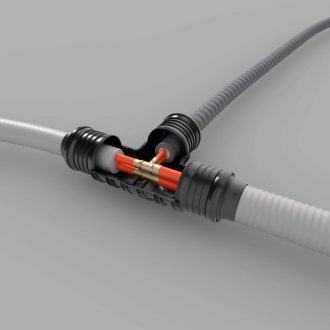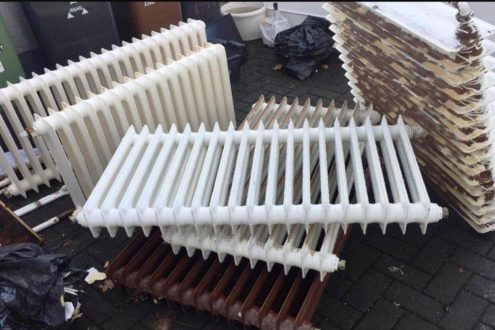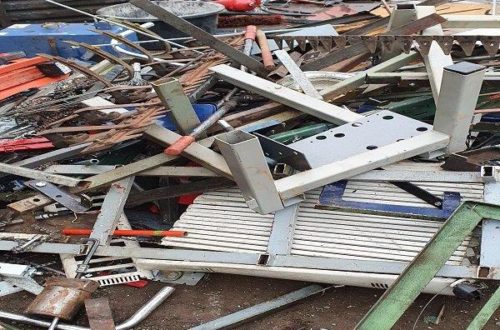RWE builds photovoltaic plants with battery storage in Germany
- Over 58,340 solar modules and two battery storage systems under construction at Garzweiler Mine
- Commissioning planned for spring 2023 / green electricity for more than 7,250 homes
- Efficient modules absorb sunlight at front and rear / increased yield
Can solar energy be used even when the sun does not shine? Yes, thanks to photovoltaic systems with attached battery storage facilities. RWE is currently constructing two plants of this type in Germany. At Garzweiler Mine near the city of Bedburg in North Rhine-Westphalia, a total of over 58,340 modules will collect sunlight to produce green electricity for more than 7,250 homes. Garzweiler Mine produces lignite for power generation in nearby power stations.
Sascha Solbach, Mayor of the city of Bedburg: “In order to secure a clean and reliable supply with electricity we not only need more energy from renewable sources, but also storage solutions like those being implemented by RWE at Garzweiler Mine. In this way, consumers can use solar power even after sunset.”
A photovoltaic plant with a peak generation capacity of 19.4 megawatts peak (MWp) and a storage capacity of 6.5 MW is being installed directly below Königshovener Höhe wind farm, which is jointly operated by the city of Bedburg and RWE. Work at this site has already started. Parts of the substructure are in place and the first solar modules have been erected. The Jackerath project with a photovoltaic capacity of 12.1 MWp and 4.1 MW of battery storage is being built at the western edge of the opencast mine. The batteries are designed for a two-hour charging and supply cycle.
“Both sites together are roughly the size of 38 soccer fields”, explains Markus Kosma, Head of Production at RWE Power’s mines. “This shows that we are recultivating land at an enormous scale, with plenty of space for renewables available also in areas where we are still mining. In this way, we are ensuring that the mining district will remain an energy location going forward.”
RWE project manager Christian Meisen adds: “We want our two combined photovoltaic and storage systems to be commissioned early in 2023. To maximise generation of green energy, we are using bifacial modules, which are photosensitive on both sides.” The advantage: in addition to sunlight hitting the panels directly, they also utilise the light reflected by the ground to the rear side of the modules. “This makes these panels extremely efficient”, says Meisen. “And with the batteries, feed-in can be optimally tailored to meet demand. We are implementing this integrated plant concept at several locations at the same time.”
A similar plant at the nearby Inden Mine is to be commissioned shortly. There, RWE has combined more than 26,500 solar modules with a battery storage system. The plant can supply some 4,000 homes with green electricity. Another combined photovoltaics and storage plant is to be constructed at Hambach Mine. The latter also is located in the Rhenish lignite mining district. RWE wants to build renewables plants with a minimum of 500 megawatts of capacity in the Rhenish lignite mining district alone by 2030.
Battery storage @ RWE
Battery storage systems are an essential part of the energy transition because they store the leftover electricity resulting from overproduction in the grid and make it available again when it is needed. As one of the leaders of the energy transition, RWE develops, builds, and operates battery storage systems in Europe, Australia and the Americas. RWE currently operates a total installed battery storage capacity of approximately 150 MW (160 MWh) and is executing battery storage projects of more than 800 MW (1,800 MWh) worldwide. RWE has the ambition to build three gigawatts of batteries by 2030. This year, RWE commissioned a battery storage system in Ireland of 60MW, and a 40MW battery storage system coupled with a solar PV plant in Georgia, USA. In Germany, RWE is currently commissioning a 117MW project that is virtually connected to the run-of-river hydropower plants on the Moselle River. In its other projects, RWE makes use of storage systems from used electric car batteries (“second life” batteries) or liquid batteries known as RedOx flow systems. In addition, RWE offers industrial customers tailor-made, cutting-edge solutions, drawing on its expertise in energy trading and innovative storage systems.
Forward-looking statements
This press release contains forward-looking statements. These statements reflect the current views, expectations and assumptions of management, and are based on information currently available to management. Forward-looking statements do not guarantee the occurrence of future results and developments and are subject to known and unknown risks and uncertainties. Actual future results and developments may deviate materially from the expectations and assumptions expressed in this document due to various factors. These factors primarily include changes in the general economic and competitive environment. Furthermore, developments on financial markets and changes in currency exchange rates as well as changes in national and international laws, in particular in respect of fiscal regulation, and other factors influence the company’s future results and developments. Neither the company nor any of its affiliates undertakes to update the statements contained in this press release.
RWE is leading the way to a green energy world. With an extensive investment and growth strategy, the company will expand its powerful, green generation capacity to 50 gigawatts internationally by 2030. RWE is investing more than €50 billion gross for this purpose in this decade. The portfolio is based on offshore and onshore wind, solar, hydrogen, batteries, biomass and gas. RWE Supply & Trading provides tailored energy solutions for large customers. RWE has locations in the attractive markets of Europe, North America and the Asia-Pacific region. The company is responsibly phasing out nuclear energy and coal. Government-mandated phaseout roadmaps have been defined for both of these energy sources. RWE employs around 19,000 people worldwide and has a clear target: to get to net zero by 2040. On its way there, the company has set itself ambitious targets for all activities that cause greenhouse gas emissions. The Science Based Targets initiative has confirmed that these emission reduction targets are in line with the Paris Agreement. Very much in the spirit of the company’s purpose: Our energy for a sustainable life.
RWE Renewables GmbH
Kruppstraße 74
45145 Essen
Telefon: +49 (201) 5179-0
Telefax: +49 (201) 5179-5005
https://www.group.rwe/der-konzern/organisationsstruktur/rwe-renewables
Press Office
Telefon: +49 (201) 5179-8453
E-Mail: guido.steffen@rwe.com
Pressesprecherin
E-Mail: sarah.knauber@rwe.com
![]()





